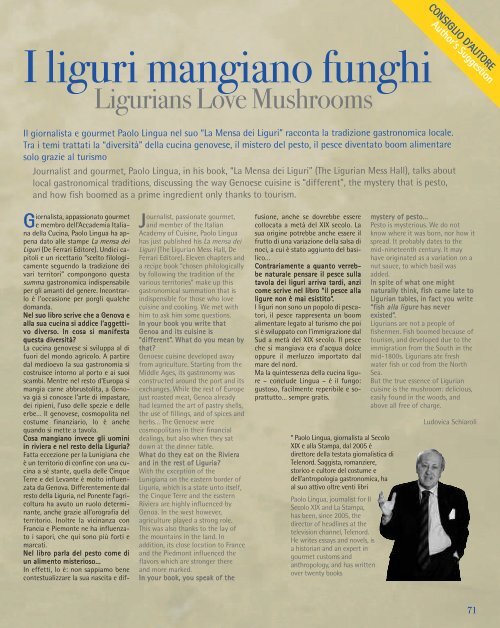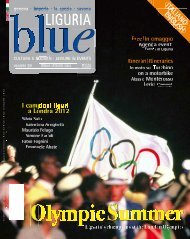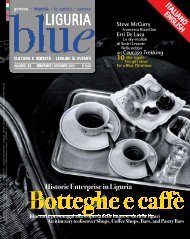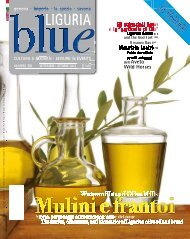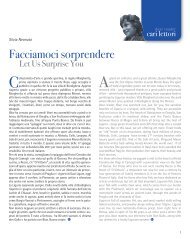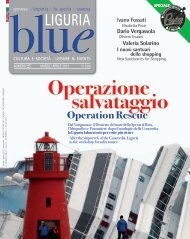cover - Blue Liguria - Sagep
cover - Blue Liguria - Sagep
cover - Blue Liguria - Sagep
You also want an ePaper? Increase the reach of your titles
YUMPU automatically turns print PDFs into web optimized ePapers that Google loves.
I liguri mangiano funghi<br />
<strong>Liguria</strong>ns Love Mushrooms<br />
Il giornalista e gourmet Paolo Lingua nel suo “La Mensa dei Liguri” racconta la tradizione gastronomica locale.<br />
Tra i temi trattati la “diversità” della cucina genovese, il mistero del pesto, il pesce diventato boom alimentare<br />
solo grazie al turismo<br />
Journalist and gourmet, Paolo Lingua, in his book, “La Mensa dei Liguri” (The <strong>Liguria</strong>n Mess Hall), talks about<br />
local gastronomical traditions, discussing the way Genoese cuisine is “different”, the mystery that is pesto,<br />
and how fish boomed as a prime ingredient only thanks to tourism.<br />
Giornalista, appassionato gourmet<br />
e membro dell’Accademia Italiana<br />
della Cucina, Paolo Lingua ha appena<br />
dato alle stampe La mensa dei<br />
Liguri (De Ferrari Editore). Undici capitoli<br />
e un ricettario “scelto filologicamente<br />
seguendo la tradizione dei<br />
vari territori” compongono questa<br />
summa gastronomica indispensabile<br />
per gli amanti del genere. Incontrarlo<br />
è l’occasione per porgli qualche<br />
domanda.<br />
Nel suo libro scrive che a Genova e<br />
alla sua cucina si addice l’aggettivo<br />
diverso. In cosa si manifesta<br />
questa diversità?<br />
La cucina genovese si sviluppa al di<br />
fuori del mondo agricolo. A partire<br />
dal medioevo la sua gastronomia si<br />
costruisce intorno al porto e ai suoi<br />
scambi. Mentre nel resto d’Europa si<br />
mangia carne abbrustolita, a Genova<br />
già si conosce l’arte di impastare,<br />
dei ripieni, l’uso delle spezie e delle<br />
erbe… Il genovese, cosmopolita nel<br />
costume finanziario, lo è anche<br />
quando si mette a tavola.<br />
Cosa mangiano invece gli uomini<br />
in riviera e nel resto della <strong>Liguria</strong>?<br />
Fatta eccezione per la Lunigiana che<br />
è un territorio di confine con una cucina<br />
a sé stante, quella delle Cinque<br />
Terre e del Levante è molto influenzata<br />
da Genova. Differentemente dal<br />
resto della <strong>Liguria</strong>, nel Ponente l’agricoltura<br />
ha avuto un ruolo determinante,<br />
anche grazie all’orografia del<br />
territorio. Inoltre la vicinanza con<br />
Francia e Piemonte ne ha influenzato<br />
i sapori, che qui sono più forti e<br />
marcati.<br />
Nel libro parla del pesto come di<br />
un alimento misterioso…<br />
In effetti, lo è: non sappiamo bene<br />
contestualizzare la sua nascita e dif-<br />
Journalist, passionate gourmet,<br />
and member of the Italian<br />
Academy of Cuisine, Paolo Lingua<br />
has just published his La mensa dei<br />
Liguri (The <strong>Liguria</strong>n Mess Hall, De<br />
Ferrari Editore). Eleven chapters and<br />
a recipe book “chosen philologically<br />
by following the tradition of the<br />
various territories” make up this<br />
gastronomical summation that is<br />
indispensible for those who love<br />
cuisine and cooking. We met with<br />
him to ask him some questions.<br />
In your book you write that<br />
Genoa and its cuisine is<br />
“different”. What do you mean by<br />
that?<br />
Genoese cuisine developed away<br />
from agriculture. Starting from the<br />
Middle Ages, its gastronomy was<br />
constructed around the port and its<br />
exchanges. While the rest of Europe<br />
just roasted meat, Genoa already<br />
had learned the art of pastry shells,<br />
the use of fillings, and of spices and<br />
herbs… The Genoese were<br />
cosmopolitans in their financial<br />
dealings, but also when they sat<br />
down at the dinner table.<br />
What do they eat on the Riviera<br />
and in the rest of <strong>Liguria</strong>?<br />
With the exception of the<br />
Lunigiana on the eastern border of<br />
<strong>Liguria</strong>, which is a state unto itself,<br />
the Cinque Terre and the eastern<br />
Riviera are highly influenced by<br />
Genoa. In the west however,<br />
agriculture played a strong role.<br />
This was also thanks to the lay of<br />
the mountains in the land. In<br />
addition, its close location to France<br />
and the Piedmont influenced the<br />
flavors which are stronger there<br />
and more marked.<br />
In your book, you speak of the<br />
fusione, anche se dovrebbe essere<br />
collocata a metà del XIX secolo. La<br />
sua origine potrebbe anche essere il<br />
frutto di una variazione della salsa di<br />
noci, a cui è stato aggiunto del basilico…<br />
Contrariamente a quanto verrebbe<br />
naturale pensare il pesce sulla<br />
tavola dei liguri arriva tardi, anzi<br />
come scrive nel libro “il pesce alla<br />
ligure non è mai esistito”.<br />
I liguri non sono un popolo di pescatori,<br />
il pesce rappresenta un boom<br />
alimentare legato al turismo che poi<br />
si è sviluppato con l’immigrazione dal<br />
Sud a metà del XIX secolo. Il pesce<br />
che si mangiava era d’acqua dolce<br />
oppure il merluzzo importato dal<br />
mare del nord.<br />
Ma la quintessenza della cucina ligure<br />
– conclude Lingua – è il fungo:<br />
gustoso, facilmente reperibile e soprattutto…<br />
sempre gratis.<br />
* Paolo Lingua, giornalista al Secolo<br />
XIX e alla Stampa, dal 2005 è<br />
direttore della testata giornalistica di<br />
Telenord. Saggista, romanziere,<br />
storico e cultore del costume e<br />
dell’antropologia gastronomica, ha<br />
al suo attivo oltre venti libri<br />
Paolo Lingua, journalist for Il<br />
Secolo XIX and La Stampa,<br />
has been, since 2005, the<br />
director of headlines at the<br />
television channel, Telenord.<br />
He writes essays and novels, is<br />
a historian and an expert in<br />
gourmet customs and<br />
anthropology, and has written<br />
over twenty books<br />
CONSIGLIO D’AUTORE<br />
Author's Suggestion<br />
mystery of pesto…<br />
Pesto is mysterious. We do not<br />
know where it was born, nor how it<br />
spread. It probably dates to the<br />
mid-nineteenth century. It may<br />
have originated as a variation on a<br />
nut sauce, to which basil was<br />
added.<br />
In spite of what one might<br />
naturally think, fish came late to<br />
<strong>Liguria</strong>n tables, in fact you write<br />
“fish aallllaa lliigguurree has never<br />
existed”.<br />
<strong>Liguria</strong>ns are not a people of<br />
fishermen. Fish boomed because of<br />
tourism, and developed due to the<br />
immigration from the South in the<br />
mid-1800s. <strong>Liguria</strong>ns ate fresh<br />
water fish or cod from the North<br />
Sea.<br />
But the true essence of <strong>Liguria</strong>n<br />
cuisine is the mushroom: delicious,<br />
easily found in the woods, and<br />
above all free of charge.<br />
Ludovica Schiaroli<br />
71


